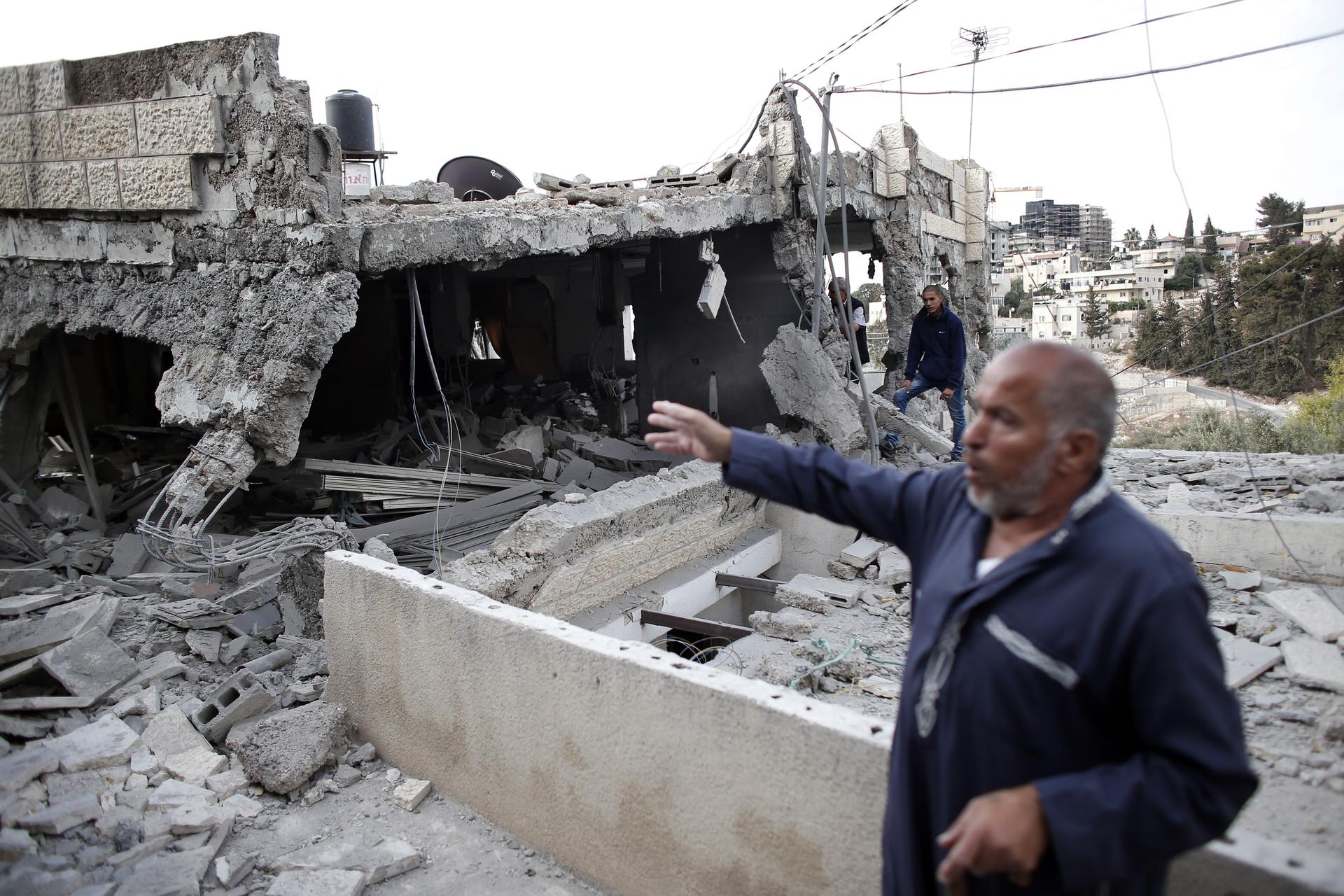Israel responds to rising violence by tearing down more Palestinian homes
A Palestinian man shows the rubble of a destroyed house after Israeli security forces demolished the homes of two Palestinians behind attacks in the Palestinian neighborhood of Jabal Mukaber in east Jerusalem, on October 6, 2015. Israeli Prime Minister Benjamin Netanyahu pledged an iron fist against mounting unrest.
JERUSALEM — After a string of attacks on Israeli civilians in Jerusalem, the government there is increasingly using a controversial measure designed to deter would-be attackers: home demolitions.
On Monday night, on the orders of Prime Minister Benjamin Netanyahu, two homes were destroyed. They belonged to Abu Jamil Jasan Ben Muhammad, who attacked a synagogue in November of last year, killing four, and Muhammed Naif El-Ja’abis, who drove a bulldozer into a public bus last August, killing one and injuring seven. Both men had been shot dead at their crime scenes. Security forces also sealed off a room in the former home of Muatez Ibrahim Halil Hijazi, who attempted to assassinate the right-wing US-born rabbi Yehuda Glick last October. He was also killed at the scene of the crime.
Demolitions of this kind have long been controversial. Since they take place after the attacker has been killed or imprisoned, it is family members who suffer the consequences, regardless of whether they have committed any crime.
The Israeli government says the method acts as a deterrent against terrorism. In the wake of recent violence — in the last 24 hours, there have been four knife attacks in Jerusalem by Palestinians against Israeli citizens — Netanyahu has called on his government to find a way to legally expedite demolitions.
"This evening, we approved stringent measures against terrorism by using a variety of means," Netanyahu said following an emergency cabinet session on Monday to address the rising violence. "We will continue to do whatever is necessary. Let us be clear — we will defeat terrorism just as we have done in the past."
"The destruction of terrorists’ homes sends a sharp, clear message to those who wish to harm Israeli civilians and security forces, that terrorism and causing harm to innocents carries with it a heavy price,” the Israel Defense Forces said in a statement in 2014, when the IDF returned to the practice for the first time five years.
But rights groups argue the home demolitions are against the law, and ineffective. “It’s illegal, it’s immoral and it’s also actually not going to achieve the stated goal,” said Sarit Michaeli, spokesperson for the Israel-based rights group Bt’selem. It is done “primarily to address political fallout” among Israelis — essentially to show that the government is doing something to stem violence, Michaeli said.
Rights workers describe the demolitions as collective punishment that violates Israeli and international legal principles.
The demolitions “punish innocent people for actions they did not commit,” said Michaeli. Plus, they disproportionately affect women and children.
The policy is only applied to Palestinians who attack Israelis, not to Israelis who attack Palestinians. But the idea that the practice is an effective deterrent has been refuted by the military itself.
In February of 2005 a military committee determined that the effectiveness of home demolitions as a counterterrorism measure was questionable and “walked the line of legality.”
The practice was halted following the committee’s report, with the exception of one demolition and the sealing of two others in East Jerusalem in 2009.
However, in July 2014, Netanyahu’s government reintroduced the practice after three yeshiva students were abducted and then killed. Since then they have been carried out regularly.
Once a demolition order is issued, families have little hope of stopping it. They can request a repeal of the order — those are almost always rejected — and then they can appeal to the High Court.
In recent years the High Court has supported the government’s decision almost without exception. Sometimes families appeal to the High Court simply as a way to buy time to get their belongings out and relocate.
